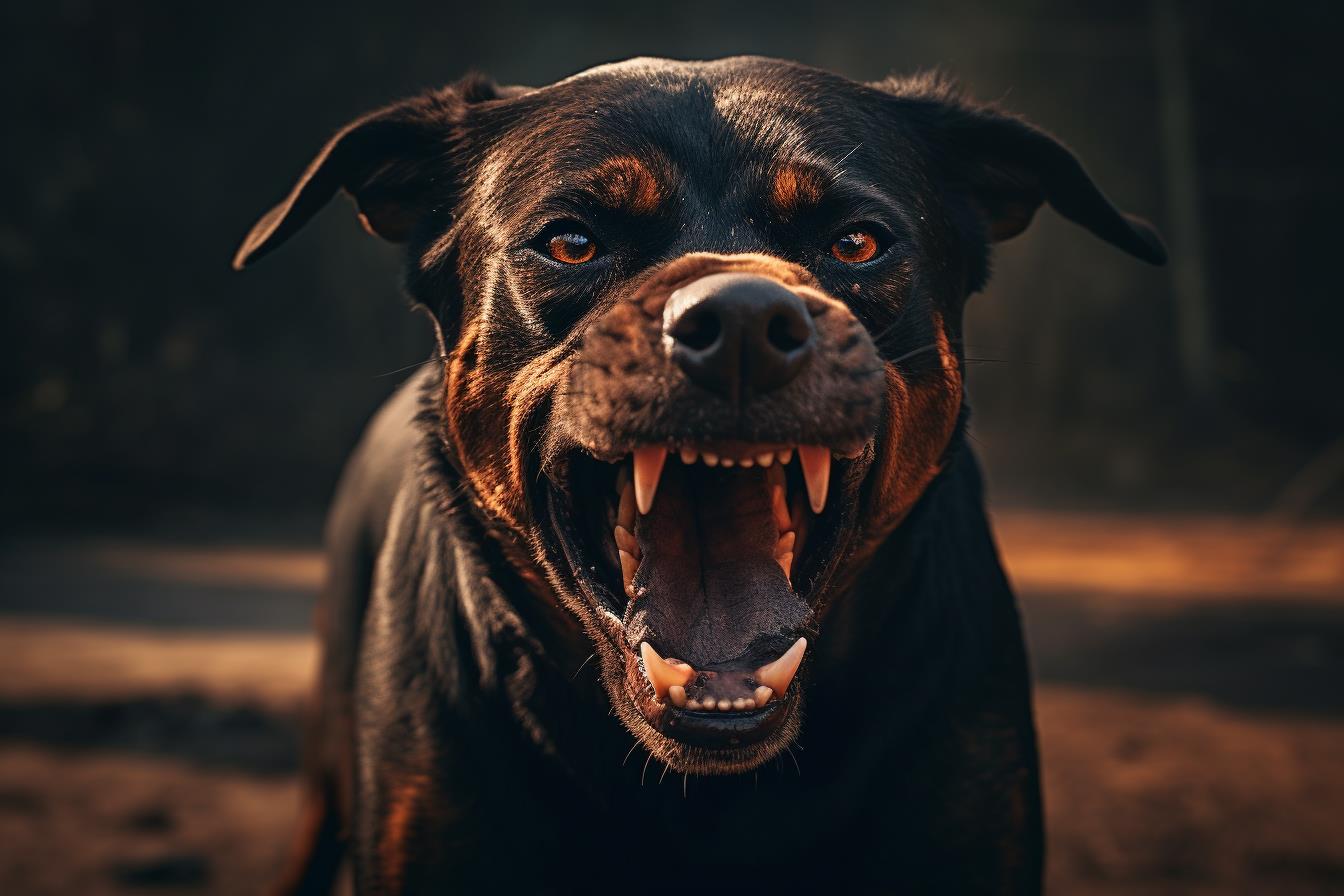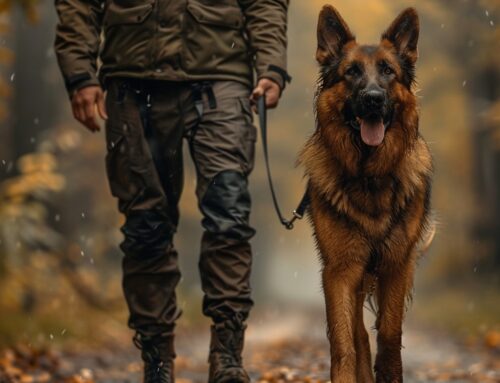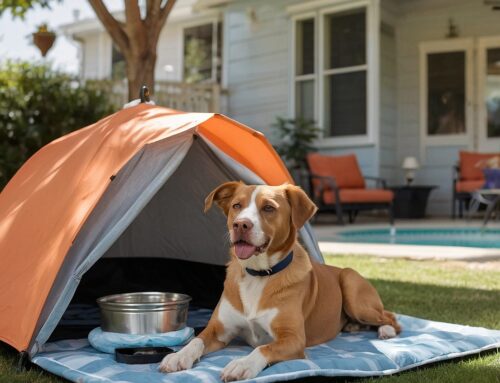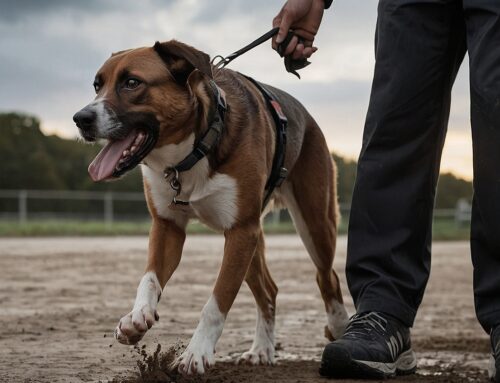While adding a furry friend to your home is often a joy, when aggression becomes an issue, seeking the assistance of a qualified dog trainer is crucial. Aggressive behavior in dogs can stem from various factors, including fear, territorial instincts, or frustration. Understanding the root causes of canine aggression is the first step toward fostering a positive environment for your canine companion. We’ll get into dog training for aggressive dogs and how to find the right trainer by first providing insights into recognizing specific triggers and then finding the right professional dog trainer for your dog’s behavior. By getting specific and following our suggestions, you’ll not only find a skilled trainer but also embark on a transformative journey to cultivate a safer and happier living space for both your dog and those sharing their world with them.
Understanding Aggressive Behavior
Aggression in dogs is a complex issue that can manifest in various forms, and before seeking the assistance of a trainer, it’s crucial to gain a deeper understanding of the potential causes and types of aggression. While physical pain can contribute to aggressive behavior, ruling out medical issues is a necessary first step. Once the health of the dog has been assessed, it becomes essential to recognize the different forms of aggression, such as fear-based aggression, frustration-related aggression, and territorial or possessive dominance. This understanding serves as the foundation for effective communication with potential trainers and aids in finding an expert with the right skills to address the specific situation of those aggressive behaviors.
Fear-Based Aggression
One of the common triggers for aggression in dogs is fear. When a dog perceives a threat or feels cornered, it may respond aggressively as a means of self-defense. Fear-based aggression can arise from past traumatic experiences, lack of socialization, or genetic predispositions. Recognizing the signs of fear-based aggression, such as growling, barking, or defensive body language, is crucial in addressing this form of aggression.
Frustration-Related Aggression
Dogs, like humans, can experience frustration, and when unable to express it appropriately, they may exhibit aggressive behavior. This type of aggression is often linked to unmet needs, confinement, or frustration during a training program. Identifying the source of frustration and providing outlets for the dog to release pent-up energy can be essential in managing and mitigating frustration-related aggression.
Territorial and Possessive Dominance
Dogs are inherently territorial animals, and aggression can arise when they feel their territory is threatened or when they perceive a challenge to their resources. Possessive dominance, where a dog guards food, toys, or other possessions, is also a form of aggression. Recognizing signs of possessive or territorial aggression, such as guarding behavior, resource aggression, or aggressive displays during specific activities like socialization with other dogs, is key to addressing these issues effectively.
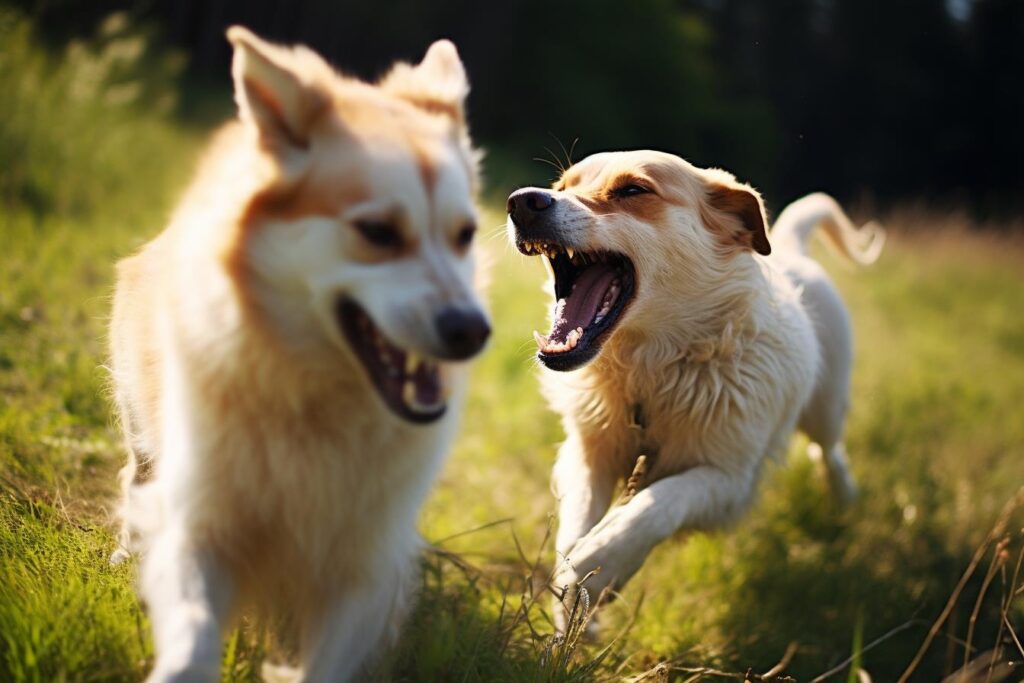
Now that we’ve established a few very important signs of aggressive behavior in dogs and some of their warning signs, it’s time to seek professional dog trainers when it comes to getting the help your dog needs.
Asking for Recommendations:
When seeking recommendations from your social circle, it’s essential to cast a wide net. Friends, family members, and even acquaintances who have had experience with dog trainers can provide valuable insights. Inquire not only about the effectiveness of the trainer but also about the specific behavioral issues addressed. Personal experiences often offer a nuanced understanding of how a trainer handles aggression and whether their approach aligns with your goals. Create a comprehensive list of potential trainers based on these recommendations, considering the diversity of perspectives to make an informed decision.
Consider joining online communities or forums dedicated to dog owners. These platforms often provide a wealth of information and personal experiences. Engaging in discussions allows you to ask specific questions about aggressive dog training and gather diverse opinions. Additionally, inquire about any local dog-related events or meet-ups where you can connect with fellow dog owners face-to-face. The more varied your sources of recommendations, the better equipped you’ll be to compile a comprehensive list of potential trainers who have proven success in addressing aggressive behavior in dogs.
Veterinarian Referrals:
Your veterinarian serves as a central figure in your dog’s overall well-being. Beyond routine health check-ups, veterinarians often have extensive networks within the pet care community. When consulting with your veterinarian about aggressive behavior, inquire not only about a trainer recommendation but also about any behaviorists they may know. Veterinarians collaborate with various professionals and can provide nuanced advice based on your dog’s health history. Building a collaborative approach between your veterinarian and the trainer can contribute to a holistic approach to addressing aggression in your dog.
When consulting with your veterinarian, don’t hesitate to discuss any specific behavioral concerns in detail. Veterinarians may have additional insights into the potential underlying causes of aggression and can recommend a trainer for aggressive dogs or behaviorists with expertise in those areas. Establishing clear communication channels between your veterinarian and the trainer can lead to a collaborative approach, ensuring a holistic understanding of your dog’s health and behavior. Moreover, inquire about any seminars or workshops that your veterinarian may host, as these events can provide valuable opportunities to learn more about aggression management.
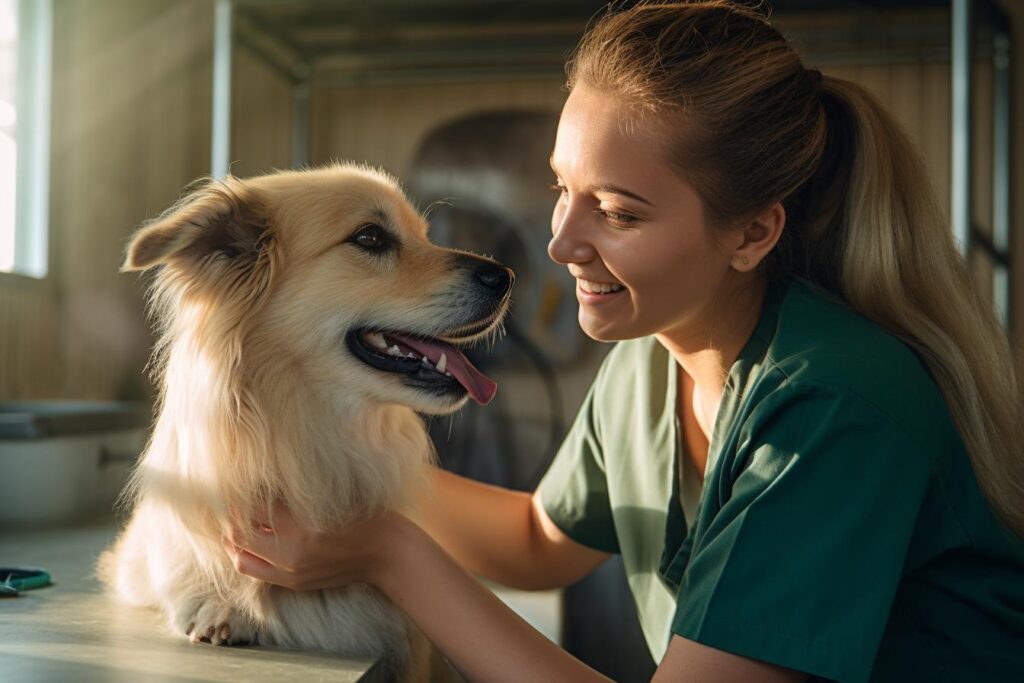
Online Searches
Utilizing online platforms for your search involves more than a simple query. When using Google, Yelp, or professional directories, consider the depth of information available. Look for trainers who have detailed profiles, including their areas of expertise, training philosophy, and client testimonials. The use of specific keywords like “aggressive dog training”, “trainer for aggressive dogs” or “dog training for aggressive dogs” helps narrow down your search to professionals specializing in the specific challenges your dog is facing. Pay close attention to reviews and ratings, focusing not only on the number but also on the content. Understanding the experiences of other dog owners can guide you in making a well-informed decision.
While conducting online searches, explore social media platforms to connect with dog owners who have faced similar challenges. Facebook groups or Instagram communities focused on dog training and behavior can be valuable resources. Engaging with these communities not only broadens your search but also allows you to interact directly with individuals who have shared their experiences online. This interactive approach can offer real-time insights and recommendations based on the current landscape of trainers specializing in aggressive dog behavior.
Visit Training Classes:
Attending local dog training classes provides a unique opportunity to witness trainers in action. Take note of their training style, methods, and how they interact with both dogs and owners. Observing a class allows you to gauge the atmosphere, the level of engagement, and the effectiveness of the trainer’s approach. Look for trainers who prioritize positive reinforcement, patience, and a genuine understanding of canine behavior. Additionally, inquire whether the trainer has experience dealing with aggressive dogs and how they manage such situations in a group setting.
By doing this provides an immersive experience, but consider extending your observation to community events or workshops hosted by trainers. These events often provide a more relaxed setting where trainers may offer insights into their training philosophy and approach. This direct engagement allows you to witness their expertise outside the structured environment of a class. Additionally, participating in workshops may offer practical tips that you can implement at home as you work on addressing your dog’s aggression.
Interviewing Potential Trainers:
Scheduling interviews with potential trainers is a crucial step in the selection process. This is an opportunity to delve deeper into their experience and methodologies. Ask about their specific experience with aggressive dogs, inquire about the success stories they’ve had, and request information about their training philosophy. A skilled trainer should be able to articulate a clear plan tailored to your dog’s unique needs. Don’t hesitate to ask for references or case studies related to aggression cases they have successfully handled. The more transparent and confident a trainer is in their approach, the better equipped they are likely to be in addressing your dog’s aggression.
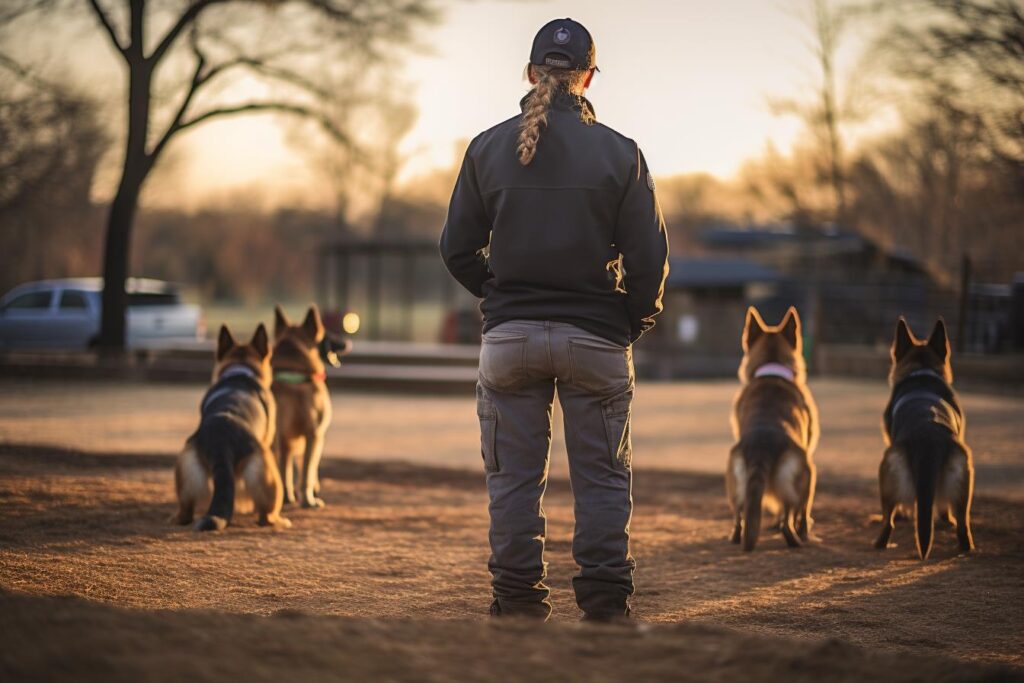
During interviews with potential trainers, discuss not only their direct experience with aggressive dogs but also their ongoing commitment to professional development. Inquire about any certifications, workshops, or conferences they attend to stay updated on the latest advancements in dog training and behavior modification. A trainer who invests in continuous learning demonstrates a commitment to evolving methodologies, ensuring that they are equipped with the most effective strategies for addressing aggression in dogs.
Trusting Your Instincts:
Trusting your instincts is the final and perhaps most crucial step in choosing a trainer. During interviews and interactions, assess not only the trainer’s expertise but also their ability to communicate effectively. A successful training relationship involves collaboration, and choosing someone who understands your concerns, communicates clearly, and instills confidence in their ability to handle aggression is paramount. Pay attention to how they interact with your dog and assess whether there is a positive connection. Your instincts, combined with the information gathered through recommendations, online searches, and firsthand experiences, will guide you to a trainer who can effectively address the aggression in your dog.
As you trust your instincts in selecting a trainer, consider arranging a trial session or consultation where you can directly witness the trainer’s interaction with your dog. This hands-on experience allows you to gauge how well the trainer connects with your dog and adapts their approach to the specific needs of your furry companion. Trusting your instincts is not just about evaluating the trainer’s expertise but also assessing the compatibility between their training style and your dog’s personality. A positive and intuitive connection will contribute to a more successful training journey for both you and your aggressive dog.
Dog Training for Aggressive Dogs
Finding the right dog trainer for aggressive dogs requires thorough research, careful consideration, and a commitment to your dog’s well-being. By following the steps outlined in this guide, you can find and identify a qualified professional who can help you navigate the challenges of aggression and create a harmonious relationship between you and your canine companion. Remember, addressing aggression promptly with the right guidance is essential for the safety and happiness of both your dog and those around you.
When you’re trying to find a dog trainer for aggressive dogs, it’s essential to prioritize expertise and a tailored approach. At Performance K9 Training, our specialization lies in addressing dog aggression, and we proudly stand as experts in guiding dogs away from aggressive tendencies. Our founder, David Greene, brings a wealth of experience, having successfully rehabilitated dogs exhibiting aggression toward other dogs and those with quarantine-related challenges. With an extensive background in the sport and K-9 world, David is recognized as one of the nation’s foremost dog trainers.
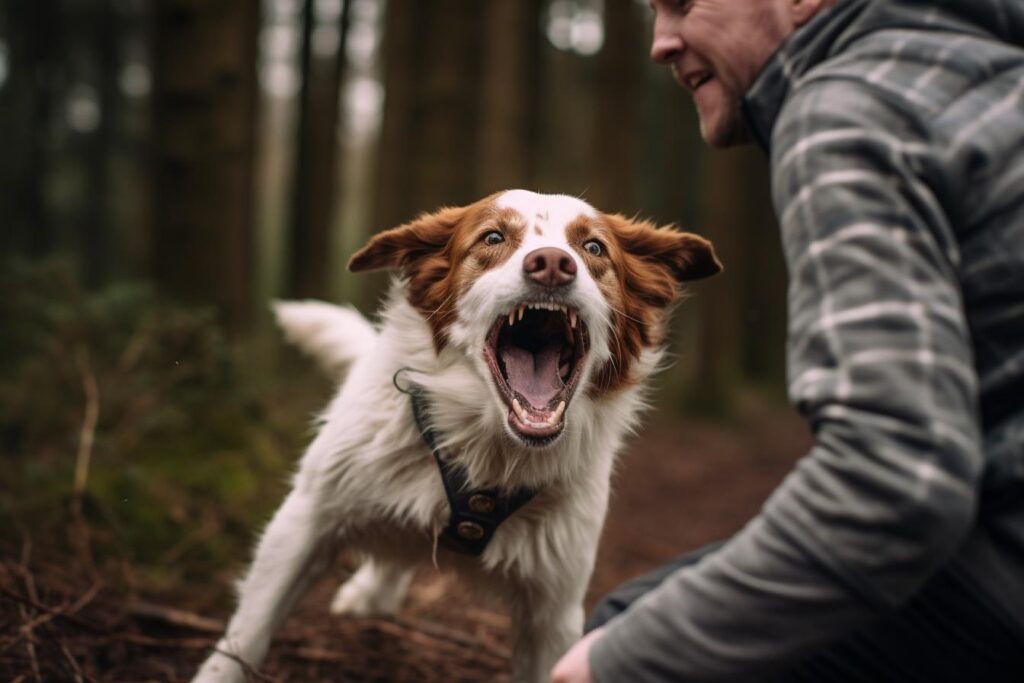
The trainers at Performance K9 Training have personally undergone mentorship under David, ensuring that our commitment to effective, compassionate, and personalized training is upheld to the highest standards. Trust us to be your partner in transforming your aggressive dog into a well-balanced and harmonious companion. Feel free to reach out to us today if you’re prepared to provide your dog with the assistance they need to overcome aggression. We’re dedicated to supporting you and your furry companions, ensuring a more harmonious life together.



